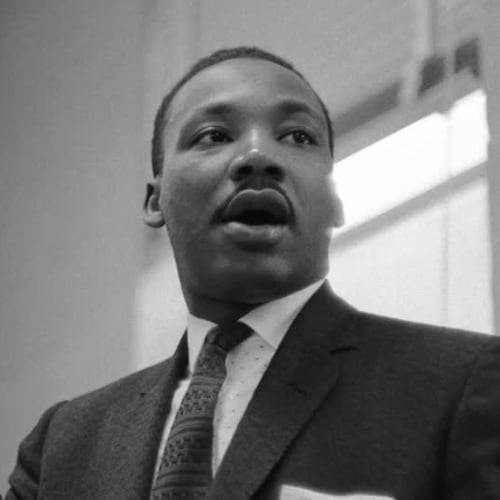On Oct. 7, 1996, Michael Thurmond was part of a delegation that traveled to England to celebrate the 300th birthday of British native James Oglethorpe, who founded the British colony of Georgia in 1733.
They visited All Saints Church in Cranham, where Oglethorpe was buried, and Thurmond spied a plaque listing Oglethorpe’s accomplishments. One eight-word sentence caught his eye: “He was a friend of the oppressed Negro.”
Intrigued, Thurmond, now the 71-year-old CEO of DeKalb County, decided to find out if this was indeed true. He embarked on a 27-year journey to study Oglethorpe’s life focused on his evolving feelings about Blacks and other minorities. Thurmond visited England multiple times to do research. The result: his third book entitled “James Oglethorpe: Father of Georgia,” now in bookstores and online.
Thurmond’s conclusion: the plaque was essentially correct.
“This book is about the ability of this man Oglethorpe to change,” Thurmond said before a packed auditorium at the Athens-Clarke Public Library Sunday afternoon. (The event was organized by by the Athens Historical Society, ASLAH, Avid Bookshop, and the ACC Libraries.)
For Thurmond himself, this talk and book signing was a homecoming of a native son who grew up in Clarke County.
“Thank you for believing in me when objective evidence stated otherwise,” he said modestly at the dais. “Thank you for encouraging me through how many losing elections.”
William Hull, who went to school with Thurmond, came to the talk to pay homage to his friend.
“He has never forgotten this community,” Hull said. “I’m going to buy his book and pass it on to my children and grandchildren and great grandchildren. It’s important for them to learn about African-American history in Georgia. And knowing it’s coming from Mike, it’s accurate.”
Credit: Nell Carroll
Credit: Nell Carroll
According to Thurmond, Oglethorpe, like many white Europeans of the time, at first perceived Black people as subhuman and soulless. He even worked for a slave-trading firm.
But enter Ayuba Suleiman Diallo, a Muslim Senegal prince who was enslaved and sent across the Atlantic Ocean to Maryland. A white lawyer and priest enabled Diallo to send a letter written in Arabic to his cleric father in Senegal. It landed on the desk of Oglethorpe, who had the letter translated.
Thurmond said Oglethorpe was so taken by the contents of the letters ― which revealed Diallo’s humanity, his dedication to his family and his intelligence ― that he helped get Diallo freed. Diallo became a cause célèbre in some circles in England as a freed Black slave. “He was LeBron James, Jay-Z and Michael Jackson all wrapped up in one,” Thurmond quipped.
Oglethorpe, his mindset shifted, later espoused an anti-slavery stance when founding Georgia in the early 1730s. Between 1735 and 1750, because of Oglethorpe, Georgia was the only British American colony to prohibit chattel slavery prior to the American Revolutionary War.
“It was a revolutionary idea,” Thurmond said. “Nobody was thinking like that.”
Indeed, pro-slavery forces eventually forced Oglethorpe out, accusing him of treason. He returned to England in 1743, never to return.
Back home, Oglethorpe didn’t end his mission to stop slavery. He befriended Olaudah Equiano, a freed British Black man who became a leading figure in the abolitionist movement in England.
Thurmond hopes his book will be used in the future as a template to reshape perceptions of Oglethorpe. “There has to be a re-evaluation of his humanitarian legacy,” he said. “He is projected as someone who cared about the impoverished white colonists. But he was far more than that.”
About the Author
The Latest
Featured


